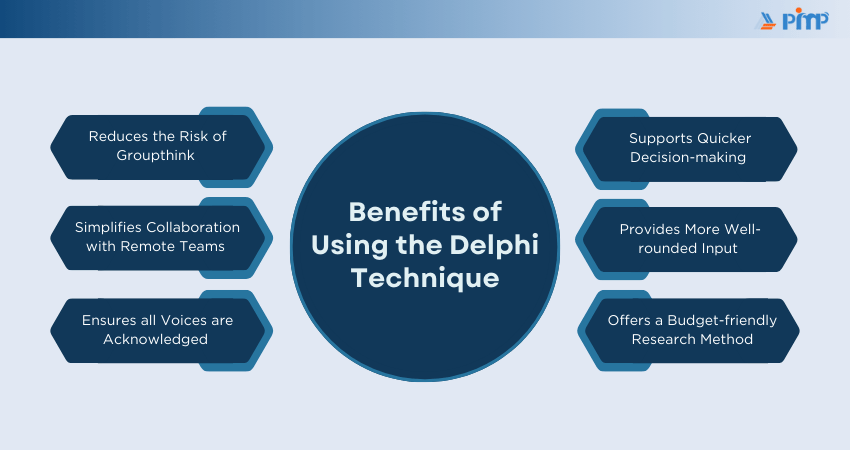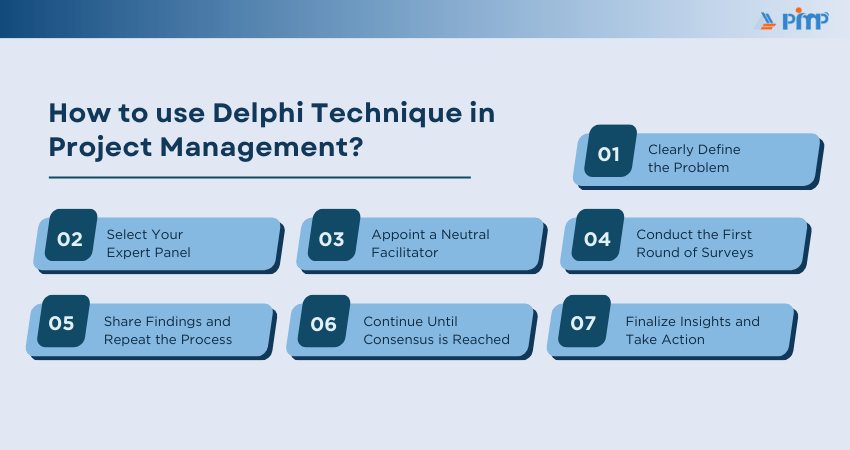







 10 Sep 2024
10 Sep 2024



When managing complex projects, reaching clear decisions among diverse stakeholders can be challenging. That’s where the Delphi Technique comes in. This method gathers expert opinions through a series of structured, anonymous surveys to build consensus. It eliminates bias, reduces group pressure, and helps teams make informed decisions.
The process is iterative and focused on refining insights with each round. The Delphi Technique in Project Management is especially useful when clarity is needed for strategic or high-impact decisions. In this blog, we’ll explore how it works, its benefits, and where to apply it effectively.
Table of Contents
1) What is the Delphi Technique?
2) What is the Role of the Delphi Technique in Project Management?
3) Benefits of Using the Delphi Technique
4) How to Use Delphi Technique in Project Management?
5) Applications of the Delphi Technique in Project Management
6) Potential Challenges of the Delphi Technique
7) What Are Real-World Examples of the Delphi Technique in Project Management?
8) Conclusion
The Delphi Technique is a structured Project Management method used to make informed decisions by gathering expert consensus. The process is started by a facilitator who uses questionnaires to gather anonymous insights from a panel of experts. The group is given a summary of these answers, which stimulates more discussion and improved suggestions.
The goal is to capture a wide range of perspectives, free from peer pressure or bias to forecast future events or evaluate complex situations. Project Managers and senior stakeholders often use these expert insights to support strategic planning and forecasting. Originally developed by the RAND Corporation after World War II, the Delphi method remains highly relevant today, helping organisations adapt to evolving technologies and modern business challenges.
The Delphi Technique plays a strategic role in Project Management by enabling teams to make informed, consensus-driven decisions, especially when dealing with uncertainty or complex challenges. It’s particularly valuable during the early planning stages, risk assessment, or when accurate forecasting is essential. On the other hand, it is hard to achieve through conventional methods.
By gathering anonymous information from a panel of experts across numerous rounds, Project Managers can avoid the influence of prevailing personalities or groupthink. This enables unbiased insights, leading to more balanced and thoughtful outcomes. The iterative nature of the technique ensures that decisions are well-considered and reflect diverse viewpoints, which is crucial in multi-stakeholder environments.
In essence, the Delphi Technique strengthens project planning, scope definition, risk analysis, and overall decision-making. Its structured approach makes it a powerful tool for improving clarity, reducing bias, and ultimately supporting the delivery of successful, high-quality project outcomes.
Structured consensus-building through anonymous expert input leads to better decision-making and reduces bias. It’s especially helpful in complex or uncertain projects requiring thoughtful insight from diverse perspectives. Here are six key benefits:

The Delphi Technique minimises the influence of dominant personalities by keeping expert responses anonymous. This ensures a wide range of honest viewpoints are shared, free from peer pressure. As a result, decisions tend to be more balanced and less likely to conform to group bias.
Geographically dispersed teams can collaborate effectively using the Delphi method without needing to meet in person. Since participants can respond at their own pace, coordinating across time zones becomes easier. This flexibility makes it ideal for gathering insights from global experts.
Every participant’s input is captured and considered, regardless of their role or seniority. The structured feedback loop highlights diverse perspectives rather than just those of senior decision-makers. This inclusive approach increases engagement and leads to richer insights.
Iterative rounds of feedback and questioning aid in improving opinions and hastening consensus. Ideas are refined with each round, producing a definitive result more quickly. This targeted procedure reduces discussion cycles and breaks through complexity.
The result represents collective wisdom rather than just individual viewpoints because input is obtained from a variety of experts. Richer, more thorough insights result from this. When expertise is combined, stronger, more comprehensive solutions are produced.
Delphi requires minimal resources, primarily time and structured communication, rather than fancy tools or platforms. It’s easy to implement with email or online surveys, making it cost-effective. Moreover, without the need for in-person meetings, expenses are kept to a minimum.
The Delphi Technique is a clever, inclusive, and effective approach to expert-driven decision-making because of these advantages. It is ideal for projects where speed, diversity of viewpoints, and clarity are crucial.
Get certified with our PMP® Training and unlock global career opportunities - Register now!
The Delphi Technique is designed to gather expert insights through an iterative, structured process. Here’s a step-by-step instructions on how to apply it effectively in Project Management:

1) Clearly Define the Problem: Begin by identifying the specific issue or decision for which you require expert input. Be as specific as possible, as this clarity helps you choose the right experts and formulate meaningful questions.
2) Select Your Expert Panel: Choose a diverse group of individuals with relevant knowledge or experience. Depending on the topic, this could include internal team members, external consultants, or subject matter specialists.
3) Appoint a Neutral Facilitator: Assign someone to manage the entire process. This person should understand the topic but remain unbiased. Their role is to craft questionnaires, consolidate responses, and keep the discussion moving in a focused direction.
4) Conduct the First Round of Surveys: Send the initial set of questions to the panel anonymously. The aim is to collect each expert’s honest, uninfluenced opinion.
5) Share Findings and Repeat the Process: Distribute the anonymized summary to the panel for review. Based on this input, follow up with a new set of questions. This back-and-forth process continues over multiple rounds, each narrowing the gap between differing viewpoints.
6) Continue Until Consensus Is Reached: The process ends when a general agreement is reached, or diminishing returns are observed in subsequent responses. Typically, 2–4 rounds are sufficient, but complex issues may require more.
7) Finalize Insights and Take Action: Once consensus is achieved, compile the final findings into an actionable report. Use this for strategic decisions, anticipating risks, or planning next steps with confidence.
Step into Strategic Leadership with Portfolio Management Professional (PfMP)® Certification - Join now!
The Delphi Technique is a practical and effective tool in Project Management, particularly in areas requiring structured expert insight and consensus.
Project Managers can use the Delphi Technique to get objective expert opinions when faced with difficult or uncertain decisions. Particularly when data alone is insufficient, the iterative process aids in improving viewpoints, reducing options, and guiding the group towards well-informed, impartial decisions.
Projects often face uncertainties that cannot be fully predicted through data models alone. The Delphi Technique enables managers to consult a panel of experts to identify potential risks, assess their likelihood and impact, and develop mitigation strategies. This proactive, forward-looking approach strengthens the project’s ability to adapt and avoid costly setbacks.
Managing project scope requires clarity on what’s essential versus what’s optional. By engaging stakeholders and subject matter experts through Delphi rounds, Project Managers can define and refine project boundaries more effectively. This helps prevent scope creep, aligns expectations, and ensures that the deliverables truly meet business needs without overextending resources.
While the Delphi Technique can be incredibly valuable in Project Management, it’s not without its hurdles. Below are a few limitations to keep in mind when using this method.
Although the Delphi process is designed to be anonymous to avoid dominant voices swaying group opinion, expert bias can still seep in. Sometimes, participants bring preconceived notions or personal preferences that may affect their judgment. This can subtly influence the outcomes, especially if the panel lacks diverse perspectives.
Reaching agreement among professionals with varying backgrounds and opinions can be tough. Some topics may lead to conflicting views that persist through multiple rounds of discussion. In such cases, the facilitator may struggle to guide the group toward a shared conclusion. Setting clear expectations and defining decision criteria early can make the process smoother.
Timelines may be extended by Delphi Technique's multiple rounds of surveys, feedback, and analysis, especially for complex projects. Participants must be patient, and the facilitator must coordinate carefully. This approach might not be the best choice if speed is your top concern. The trade-off, though, is frequently knowledgeable, trustworthy input that promotes wiser long-term choices.
Mentioned below are some real-world examples of the Delphi Technique in Project Management, showcasing its diversity and effectiveness:
1) Software Development Forecasting: In digital product teams, experts use Delphi rounds to estimate features, test timelines, and priorities for backlog items. Iterative feedback refines estimates and helps manage scope effectively.
2) Risk Assessment in Complex Projects: Project Managers consult subject-matter experts through anonymous surveys to identify potential threats and evaluate their impact. The iterative nature of Delphi ensures a well-rounded view of risks before finalizing mitigation plans.
3) Strategic Planning and Forecasting: Organizations use Delphi to forecast market trends, technology adoption, or future demand. By refining expert opinions over multiple rounds, they create reliable long-term strategies.
These examples show how the Delphi Technique supports well-informed, expert-driven decisions, particularly when precision, objectivity, and in-depth knowledge are important.
The Delphi Technique in Project Management offers a thoughtful, structured way to gather expert insights. Encouraging anonymous input and iterative feedback helps eliminate bias and reach well-rounded decisions. While it takes time and effort, the clarity it brings can be invaluable. Teams benefit from better collaboration and more confident decision-making. When used strategically, the Delphi Technique can significantly enhance project outcomes.
The Certified Associate in Project Management (CAPM) ® Training is your gateway to global recognition and exciting opportunities – Join now!






© Copyright 2025. All rights reserved. Contact: PMP® TRAINING ACADEMY.


